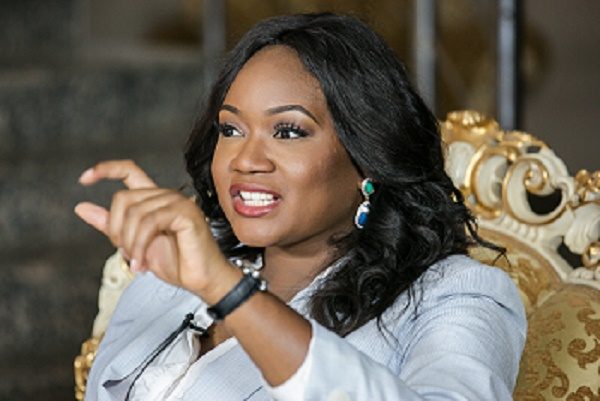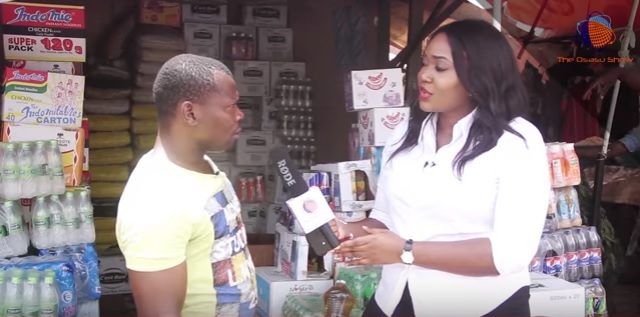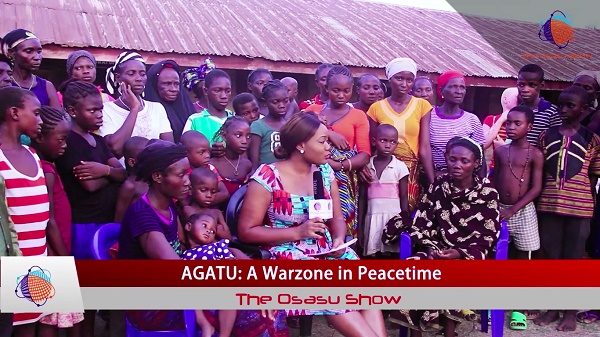She needs no introduction although its possible you’ve seen her work already but are not yet familiar with her name.
A passionate media professional and broadcast journalist whose television programme, The Osasu Show is featured on AIT, BENTV London and ITV, Osasu Igbinedion is already making big waves. Democracy Day weekend, her interview with traders at Garki market on the performance of President Muhammad Buhari was the most viewed and discussed news item by Nigerians all over the world. Collectively that video is currently approaching 1 million views.
Osasu has a portfolio of video broadcasts that range from sit downs with powerful public figures to exclusive features on the Agatu massacres. Her portfolio of work can be viewed on the show’s Youtube channel.
In this interview with the HERALD newspaper, she speaks on how the Nigerian government can promote inclusive and sustainable economic growth, create jobs and ensure equitable quality education for all.
You are being hailed as one of the most vibrant newcomers to the journalism sector? Why did you embark on this particular career?
I’ve always been passionate about poverty eradication and psychological and physical empowerment for the poor. Few years ago, I sat to think how my education coupled with my work experiences can enable me achieve these goals as a business woman (as I’ve never wanted to get involved in politics). I prayed about it and God revealed to me that purpose is to bridge the divide by giving a voice to the voiceless masses and put them in a position where their leaders will hear their cry for help or commendations. The result of this has led to my said goals which is the promotion and discussion of economic growth via physical- financial empowerment for the poor as well as quality infrastructure for education, health and so on.
 Your interview with Mr. Chido and other traders at Garki market has gone viral on social media. Was this your most memorable interview ever? Which other moments were significant for you?
Your interview with Mr. Chido and other traders at Garki market has gone viral on social media. Was this your most memorable interview ever? Which other moments were significant for you?
(laughs) I spoke with Mr. Chido not too long ago and he is basking in the joy of his newly found celebrity status. The man is something else. I was completely taken aback by how quickly it went viral because I do this type of interviews all the time. I go to the market, I walk the streets and ask people to assess policies, government effectiveness and so on. So my visit to Garki market was just like any other show. The day I went to Garki, I first of all interviewed another trader who I was familiar with, his name is Mr. ThankGod. I had interviewed him almost a year ago before President Buhari was sworn into office. During my interview with him Mr. Chido started shouting “all this one wey una dey do we no dey see any impact. everyday interview interview yet nothing dey change.” My camera crew then appealed to him to be quiet that we will come and interview him after we were done with Mr. ThankGod.

As you rightly said, the rest is history as he is now a viral sensation. I knew he went viral when I started getting calls from Governors, Ministers, Senators, Entertainers, people in Singapore, Spain, Turkey, UK, US and I can’t even list the amount of calls my team and I received because of Mr. Chido. Initially, many people were fearful for his life and mine but I ensured them nothing will happen and by the grace of God nothing has and nothing will. I remember during President Goodluck’s administration I did an episode titled “into the streets” and people shared similar apprehensions as well. TOS is a free and fair platform with zero tolerance for partisan politics. Our purpose is to give the masses a platform to share their thoughts and plights because their leaders are watching and listening. In special episodes you can visually see us bridging the gap, for example we brought a taxi driver on the show sitting directly opposite Femi Adesina, he had the opportunity to tell the President, represented by his Special Adviser to Media and Publicity, what his struggles were and what he needed him to do. This is the aim of The Osasu Show; holding government accountable by giving a voice to the voiceless. The moment we lose this drive and are coerced to silence the masses is the day I’ll quit journalism.

What quality do you think makes it easy for you to track some of the elusive public figures you’ve been able to interview on your show?
Prayers, transparency and persistence. Most of them know The Osasu Show is nonpartisan so they feel comfortable coming on the show knowing they can speak their minds and will not be sabotaged.
You were recently at Agatu after the massacre that took place. How did you feel when reporting the incident?
I actually visited Agatu Local Government area of Benue State in April. As a journalist, it is simply not enough to broadcast secondary news from your studio at all times. So I took it upon myself to go down to Agatu to ascertain facts because there were a variety of figures floating around in regards to the number of people that were killed during the herdsmen clash.
Upon my arrival to Agatu, the first thing I noticed was the deplorable road infrastructure. I obviously travelled by car (Benue has no commercial airports) and Agatu is about three hours away from Makurdi. Even when we got to Agatu, a journey that should have taken us 15 to 20 minutes to the LGA Chairman’s residence took us another 45 minutes to an hour.
That aside, after my interview with the LGA Chairman he took us around to the different communities. I was shocked to see the level of destruction that had been done. Houses, churches, hospitals, schools, cars were all burnt down. The people remaining in the communities complained to me that they had no drinking water, clothes, nor a place to lay their heads. It was extremely heartbreaking to see.
I was relieved, however, because I knew the effect of finally giving them a platform where their voices will be heard nationally and internationally. After the episode aired, the local government Chairman called me to let me know that their leaders and other charitable organisations had come to donate to them en masse.
There is still a lot of rebuilding and charitable work that needs to be done but I’m happy about the positive reactions The Osasu Show was able to ignite.
Didn’t you fear for your life maybe a reprisal attack might occur?
Initially, not really but the day my crew and I arrived in Benue State we took food items to an IDP camp in Makurdi where they told us about an new attack that had just occurred in a nearby community. That obviously made us a little apprehensive but I said to myself and my crew that it was too late to turn back as we were already in Benue and had an obligation to give the people a voice so they can get the help they needed. Thankfully, they all agreed.
How come a person like you, born with a silver spoon, is fighting tooth and nail to eradicate poverty in Nigeria?
Well, to whom much is given much is expected. Africa’s potential is enormous and it is up to us, here and now, to exploit and develop that potential. We have the resources to eradicate poverty. Change starts individually not collectively, that is something we all must understand. A lot of people see poverty as an African endemic that can never be cured but I personally beg to differ. There are two foundational issues Nigeria must tackle if we truly want to end poverty and create a conducive environment. The first is providing quality education for all. Secondly, building and empowering small to medium scale businesses.
Social entrepreneur, Muhammad Yunus said in his book, Banker to the Poor, which happens to be one of my favourite books, “the poor are poor not because they are untrained or illiterate but because they cannot retain the returns of their labor. They have no control over capital, and it is the ability to control capital that gives people the power to rise out of poverty.” I’m not ignoring the fact that there are people who are poor because they are lazy, trust me I’ve met a few of those. However, the number of people willing to work in order to empower themselves and households are more. All they need is the startup capital and financial literacy.

I’ve put this premise to practice before, so I’m speaking from experience. The Osasu Show Social Enterprise Programme has been able to empower poor women by giving them capital to start small scale businesses. I saw first hand the social and economic impact of the success of this programme. One recipient was only able to receive antenatal care because of this. Another claimed to be able to send her child to school, and another could finally feed her family three square meals daily.
The ripple effect of empowering the lower class is economic growth and employment. Take for instance these recipients I just mentioned, the first is now able to patronise a hospital, the second, a school, and the third, a market. Imagine multiplying this by 100 million or more. You can see the cycle of economic growth and development taking place.
 Another way to eradicate poverty is through education. According to the New York Times, “Nigerians make up less than 1 percent of the black population in the United States, yet in 2013 nearly one-quarter of the black students at Harvard Business School were of Nigerian ancestry; over a fourth of Nigerian-Americans have a graduate or professional degree, as compared with only about 11 percent of whites.”
Another way to eradicate poverty is through education. According to the New York Times, “Nigerians make up less than 1 percent of the black population in the United States, yet in 2013 nearly one-quarter of the black students at Harvard Business School were of Nigerian ancestry; over a fourth of Nigerian-Americans have a graduate or professional degree, as compared with only about 11 percent of whites.”
If Nigeria is able to build quality educational institutions like Harvard, Yale, MIT, Oxford and so on, that are either subsidised through scholarships or free to the poor, we will be better off as a nation. What makes an Ivy League school great? Money, Professors and the Curriculum. Its unfortunate that we have teachers who do not get paid, who aren’t even educated in basic mathematics, english and geography. These are the people we entrust to impart knowledge in our kids. Today we find ourselves in a situation where we are begging our brightest minds to return home from Diaspora. What does this mean for those who schooled locally? Are they no good? If so why? We must identify what is not working and reinvent the wheel especially if we want to see any meaningful change in our society.
If our educational institutions were up to par, we are looking at an increased GDP and individuals that are forever indebted to our country and would want to invest and develop Nigeria for future generations. The importance of quality education must not be undermined in the fight to reduce inequalities and eradicate poverty. In fact, the most popular way to keep a man down is by starving him of quality education.
As soon as our government can get these two areas right, a good percentage our problems as a nation will seize to exist. Look at African countries like Ghana and Kenya, their economies transformed overnight just by building quality schools, creating economic growth and jobs through empowering the general populace in agriculture and small to medium scale enterprises. Nigerians who can afford it, send their children to schools in these African countries and you can just imagine the effect it has on their own economy as opposed to ours.
How can government accomplish this given the current state of our economy?
We currently have a budget to implement this and I’m glad you asked this question because I’d like to appeal to Nigerians not to focus too much on Nigeria’s economic downturn. There are plenty of businesses that thrive in more deplorable economic situations. I remember during the 2008 recession in the United States, businesses like Walmart (commodity store) were expanding although the media hardly reported this and focused more on the businesses that weren’t.
What I try to do on The Osasu Show is discuss the positives, what is the solution to the current economic downturn and what can we do with with what we have, where we are, right now. I was reading the 2016 Africa Prosperity Report the other day which underscores the premise that human progress goes beyond economics. The report reveals that for any nation to flourish they must provide its citizens access to quality education, healthcare and opportunities for financial empowerment. In the 2016 budget, the present government is planning to inject N350B into the Nigerian economy and respectively giving out N500M to one million Nigerians.
If I were to advise the President, I’d execute this strategy a little differently. I would create a system that invests directly into already existing small to medium scale businesses and empowering the unemployed with start up capital and financial literacy to create small businesses. The difference between both strategies is the effect on our economy. The former has little to no effect nor can its impact be assessed a month or two from now, but the latter would result to economic growth and employment. Quality Education, Healthcare and Structured financial empowerment programmes are the foundational ingredients for any successful nation.

